It's called Hells Canyon, but the nearly 100-mile section of the Snake River that wriggles through North America's deepest gorge is definitely a generous slice of heaven.
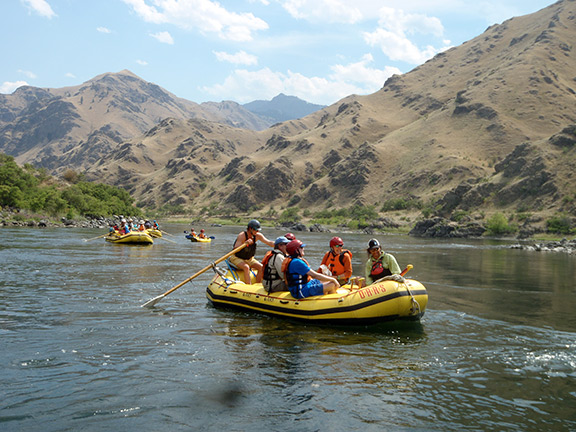
Rafting the Snake River
I had seen snippets of Hells Canyon from high above while flying in airplanes, but a five-day rafting/kayaking trip provided a water ouzel-eyed view of the river that's mostly inaccessible by road.
A great time was made better because the crew from OARS, the outfitter that organized the trip, included a geologist-anthropologist well versed in the canyon's cultural history, a chef who prepared sumptuous gourmet appetizers and dinners, and the owner-winemaker of a boutique winery who provided nightly commentary and generous samples. It was promoted as a wine tasting trip, but I found myself more intoxicated by the sights and sounds, from the river's raw, rugged setting to the morning trills of canyon wrens.
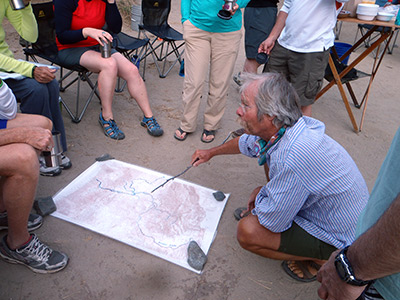
Lesson time with Morris Uebelacker
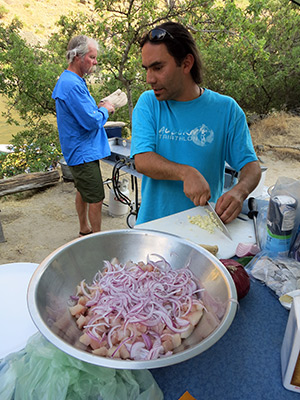 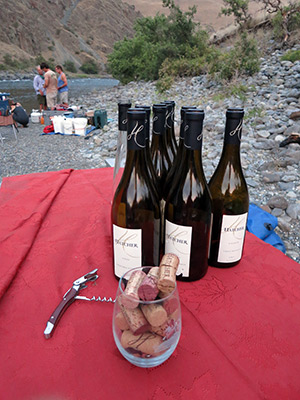
Chef Cristan Vargas Bottles of Hatchery wines
Getting from the meeting place in Lewiston, Idaho, to the put-in site below the Hells Canyon Dam was a trip itself, literally and physically. Our group of 14, along with two of the eight staff from OARS, flew an hour from Lewiston to the Oregon community of Halfway in three small aircraft. We savored eagle-eye views of the Snake River and Wallowa Mountains before landing—surprise—on a dirt airstrip. Less than an hour later, shuttle vans deposited us at our armada of ready-to-go rafts and inflatable kayaks.
Things began quickly with a pair of deceptively thumpy Class 4 rapids, Wild Sheep and Granite. They made swimmers out of most of the paddlers in the bouncy inflatables, appropriately nicknamed “Duckies.” More challenging rapids – Waterspout, Rush Creek, Tyron, Wild Goose – soon followed.
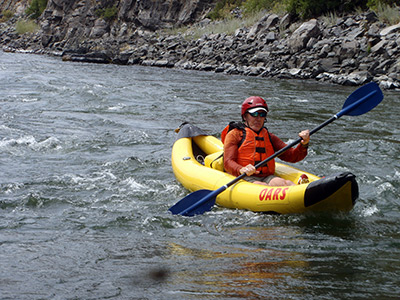 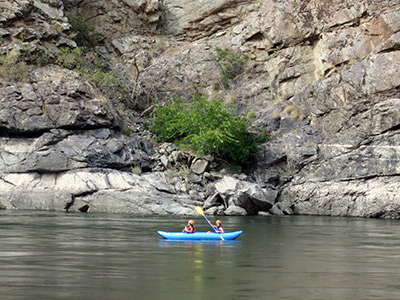
Rubber duckie Paddlers on the Snake
Unusually, there was more than one way to travel the river. The duckies were the most active way to travel the river, but the options also included a paddle raft, oar-powered rafts (where passengers did nothing more than enjoy the scenery) and a dory, a small, shallow draft boat that provided rodeo rides through large rapids. During the five river days, I tested all four conveyances.
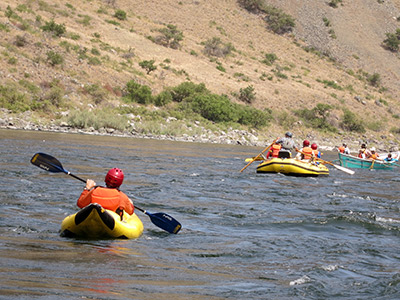
Paddle time
Whether paddling or sightseeing, there was much to enjoy. The canyon is gorgeous, often squeezing through passages with steep, narrow and towering walls. Other times it's wide and broad, barely deep enough to avoid scraping bottom. The Snake literally snakes a watery path with Oregon on its western flank and Idaho on its eastern side. Flowing north on our final day, Oregon eventually gave way to Washington.
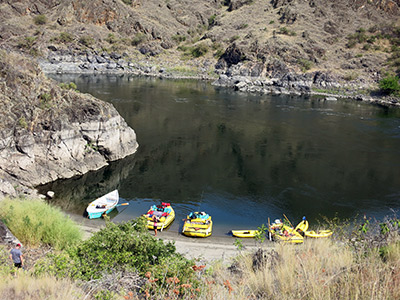 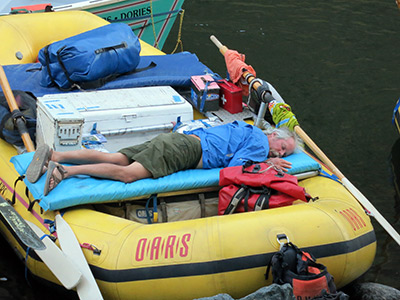
Rest stop Nap time
Traveling the Snake is traveling through history. The history of the Nez Perce and Shoshone-Bannock tribes is remembered at places like Battle Creek, where the tribes fought each other, and from the abundant but seldom seen pictographs and petroglyphs on canyon walls. The Snake also figures in the history of the Lewis and Clark expedition, gold miners, homesteaders and battles over controversial hydroelectric dams.
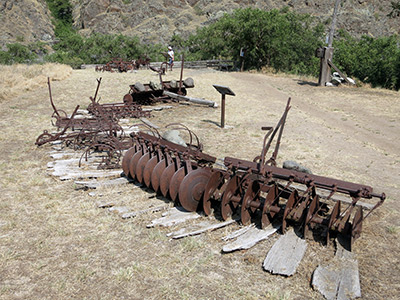 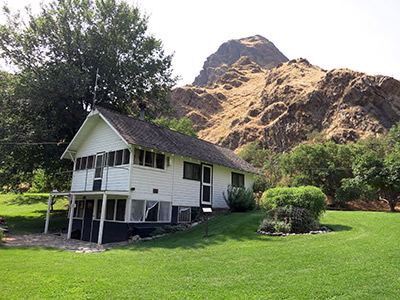
Old-time farm equipment Historic ranch house
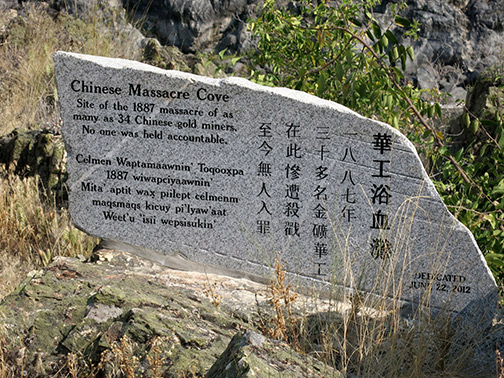
Remembering the Massacre
Thanks to Morris Uebelacker, a retired cultural anthropologist, each day's travel was supplemented with side excursions. Sometimes we visited riverside Indian sites, another time we rambled about the Kickwood Historic Ranch and Museum, a preserved homestead ranch. More sobering was the Deep Creek Massacre site, where outlaws murdered up to 34 Chinese miners in 1887. We earned the best views by hiking to a wow-inducing river overlook at Suicide Point. According to a legend that Uebelacker discredits, Suicide Point gets its name from a heart-broken Nez Perce who, some say, rode his horse off the cliff, killing him and the horse.
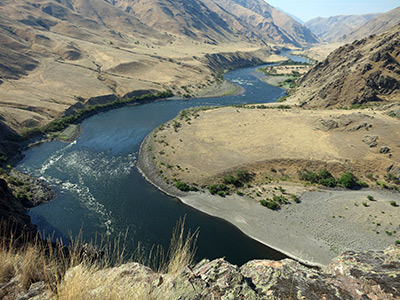
View from Suicide Point
Good fortune allowed us to view fisheries biologists measuring and collecting data from a captured sturgeon. It was 72 inches long and weighed 94 pounds, making it a relatively young, small fish for a species that can be 15 to 18 feet long and live more than a hundred years.
Along the river we viewed a trio of deer with massive racks that impassively watched us from the shade of a tree. Several times we saw bighorn sheep, including massive horned bucks lazing in the sun. At one campsite, other bighorns grazed above us on steep sloped walls. We saw many bald eagles, including one that flew less than 20 feet above us carrying a big-eyed fish in its talons.
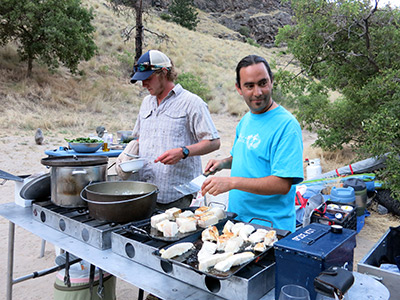
Cristian at work
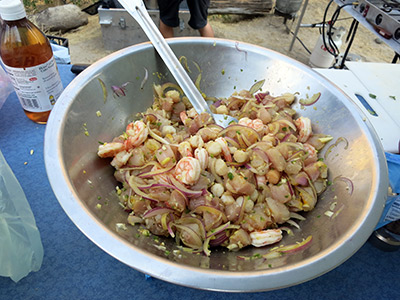 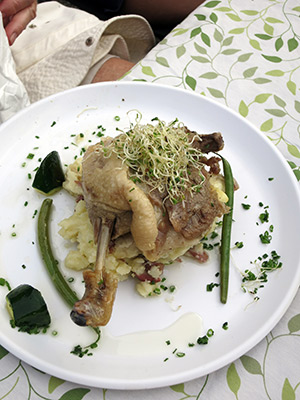
Yummers, ceviche Duck confit
The eagle ate well that night, and so did we. At our nightly campsites, chef Cristian Vargas prepared appetizers and dinners. The first night included one of my favorites: ceviche, followed by halibut in a shrimp sauce. Drool. Over the nights that followed, the entrees included duck confit, slow-cooked and grilled lamb, steamed vegetables, marinated strip steaks and more.
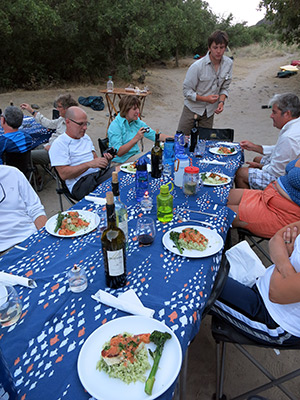
Wine and dine, with no whining
Rough it, we didn't. All four nights, with a satiated belly, I spent under the stars, waking to a sky bulleted with millions of points of light.
Traveling the Hells Canyon of the Snake River was a hellaciously great trip, on the river and off.
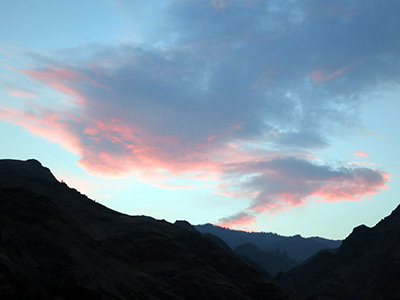
Sunset from the Snake River canyon
If You Go
OARS offers a wide variety of river, hiking and other adventure trips worldwide, including several one- to eight-day wine tasting tours in the U.S. and Canada. For information visit their website at www.oars.com. Under special interest trips, check out wine tasting tours. Wine tasting trips are offered on several rivers, including the Snake, Middle Fork of the Salmon, Rogue, Tuolumne and American.
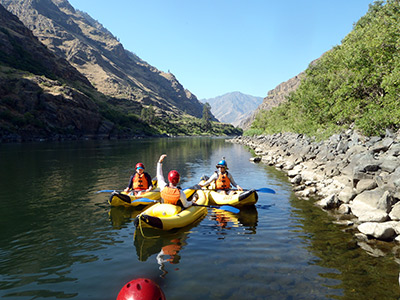
Ready to paddle
Hatchery Winery, which has a tasting room in the foothills of the California gold rush country, provisioned wines for my trip, with owner-winemaker Matthew Hatcher providing the wine and information. For more about Hatchery visit their website at www.hatcherwinery.com.
About the author
Lee Juillerat writes and photographs for a daily newspaper in Southern Oregon and does freelance work for a variety of magazines and newspapers. He's the author of books about Crater Lake National Park and a frequent contributor to historical journals. Juillerat can be contacted at [email protected].
|